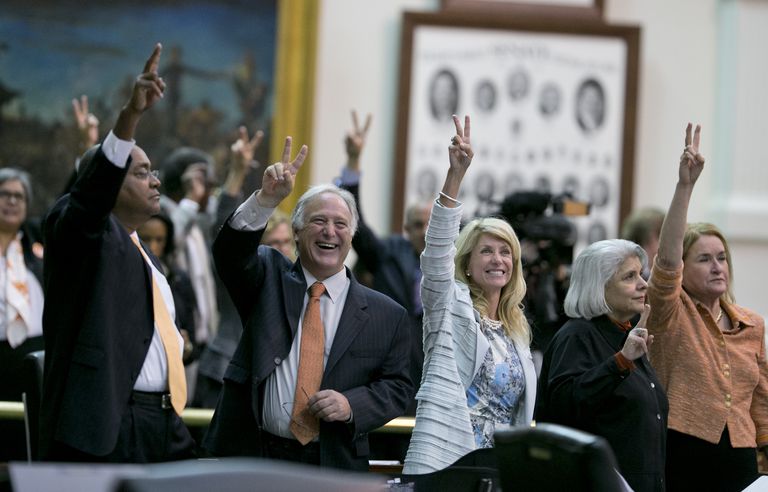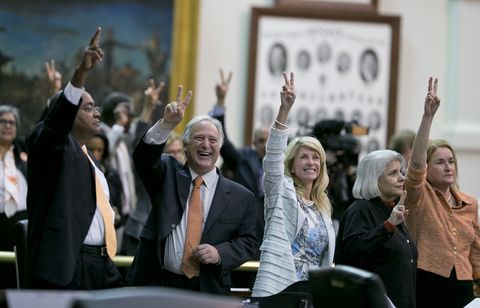
I’m going to admit something to you that I’ve never told anyone outside my closest friends and family. When I was a pre-pubescent adolescent, I wrote in my diary that I thought abortion was wrong. I did not understand why or how women would choose it as an option. At the time, I was steeped in the teachings of the evangelical movement due to the influence of a maternal uncle who had been taking me to attend church services at Christ for the Nations Institute in Dallas where he was enrolled.
To this day, I have always respected people whose perspectives on abortion differ from the strongly pro-choice one that I have since come to adopt. Maybe because I once held those same beliefs, I understand how the “moral” teachings of one’s church can instill a sincere belief that abortion is wrong.
But, while I have respect for a point of view that differs from mine, I draw the line when someone’s perspective on what is “moral” is imposed on those of us who see things differently, particularly where the imposition of that perspective demands that I give up my right to make decisions about my own body, my own future, and my own understanding of what is best for me and my family. I particularly take issue with that imposition when, instead of representing an honest difference of ideals and values, it is used as a wedge to gain political advantage. And, really, that’s what the conversation about abortion rights and the proposed appointment of Brett Kavanaugh to the Supreme Court is pretty much all about right now—politics.
How did my own thinking on abortion evolve? It’s simple really. I opened my heart to the understanding of other women’s stories. I saw the role that reproductive autonomy through contraceptive care played in my own ability to rise from struggling single mom to Harvard Law School grad. In short, I began living a life of empathy and understanding. I came to see that no outsider should ever be allowed to impose his or her judgment on what women know to be best for ourselves. And then, many years after becoming pro-choice, I made an abortion decision myself, terminating a much-wanted pregnancy after the discovery of a fatal fetal abnormality. I cannot imagine someone making such a deeply personal decision for me.
Women choose abortion for a myriad of reasons. No single one of them is exactly alike. Each story is as unique as the woman who can tell it, should she choose to do so. Some, like me, make wrenching decisions when faced with devastating news. Some are survivors of sexual abuse. Some are already mothers, both single ones and married ones, living the challenge of providing for children that they already have. Some are in high school or college and have dreams of making something of their lives before they become mothers, if ever.
What we know about reproductive rights, including abortion, is that when the Supreme Court enshrined those rights with the protection of law, women’s ability to decide when and whether to have children changed our trajectory. We no longer had the threat of losing our lives if we chose not to carry an unplanned pregnancy to term. We became the authors of our destiny. We made a bold step toward what it means to live as equal citizens of this country and of this world.
I cannot state this more strongly: we cannot afford to go back. And even if you believe abortion is a decision you would not make for yourself, I hope you’ll fight alongside your sisters who have made or who might make such a decision in the future.
Make no mistake about it, we WILL go back if Brett Kavanaugh is appointed to the Supreme Court. How do I know this? It’s simple—because it’s what Trump has said he would do with his next Supreme Court appointment. And it’s what Kavanaugh himself has made clear he will do, having previously praised the dissentin Roe v. Wade and having opined in a recent appellate decision that he thought the government had a right to deny a young immigrant woman access to abortion care.
Let’s be clear what this is all about. The political forces supporting Kavanaugh’s appointment aren’t just trying to end abortion. They’re trying to stop women from controlling our own lives, families, and futures. They are dead-set on making sure that women will remain unequal in the eyes of the law, society, and the economy. Their success will devastate any hope that we have of living to our fullest potential. So, yes, the stakes are high and our voices are needed as much, if not more, than they’ve ever been.
I realize that the battle over Kavanaugh’s confirmation may look like it’s a lost cause because I know what it’s like to believe that the deck is stacked so high against you that you are tempted to give up before you even start. I live in Texas after all, and I’ve faced many overwhelmingly high “decks” in the past. But, just as I tell the young #Changemakers that we work with at my non-profit, Deeds Not Words, we cannot let long odds keep us from engaging in a fight worth waging.
For the doubters, you need only to recall our battle here in Texas in June of 2013 against an anti-abortion bill making its way through the Texas legislature. In a state where we’ve become conditioned to give up in the face of overwhelming political and social challenges, where many of us don’t even bother to vote because we don’t think it will make a difference—even in this state—we’ve learned that we can make a difference when we decide not to cede our power. We, through the “People’s Filibuster,” armed with the personal stories of the thousands of women who sent them to us to be read on the Senate floor that day, demonstrated that we truly do possess the power to change things when we show up, stand up and fight with everything we have for what we believe to be right.
What made the difference in Texas that day—the reason we were able to kill that anti-abortion bill by talking it past the midnight deadline for a vote—is the same thing that will make a difference in whether Kavanaugh is successfully appointed to the Supreme Court. That difference is YOU. That difference is making a decision to fight, even if you think we might lose. Our sisters, our daughters, and the daughters of our daughters are relying on us to give this all we’ve got. Are you in? Because I most certainly am.
Wendy Davis is the Founder of Deeds Not Words and was a member of the Texas Senate from 2009 to 2015. She will be on the road this year with the Rise Up for Roe tour.
Keep Reading

